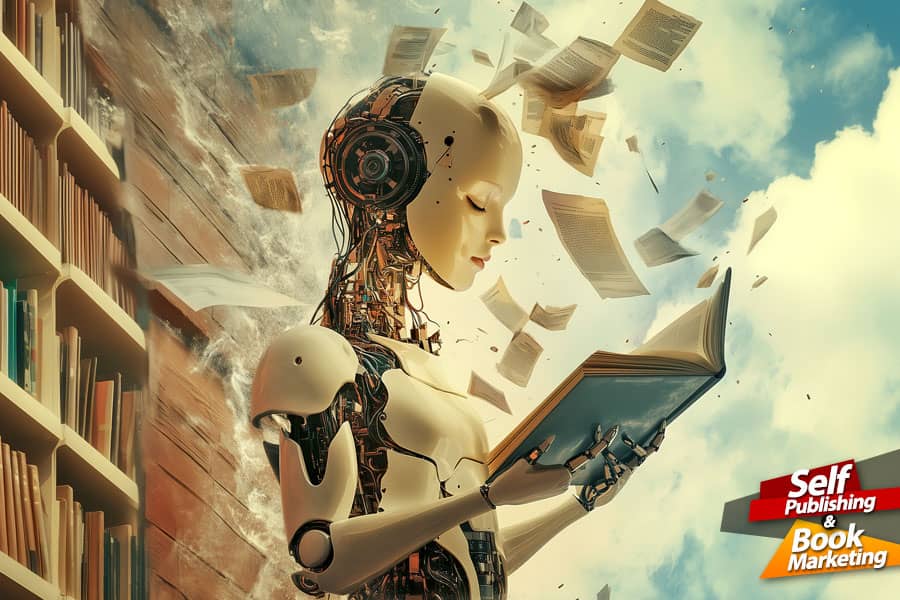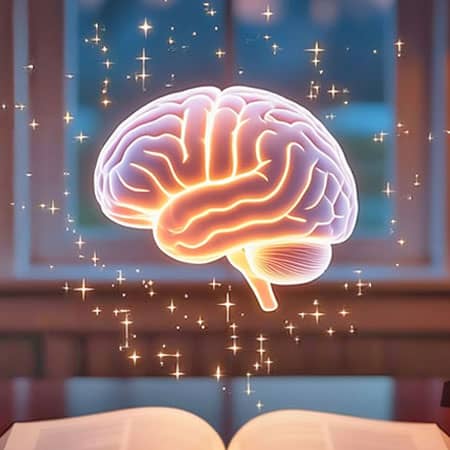
Andrea Waltz - May 22, 2025 - 
AI for Authors – Is Creativity Dead?
The arrival of artificial intelligence into the world of writing for both fiction and nonfiction has set off a seismic shift, especially for independent (“indie”) self-published authors.
What once was a deeply personal, manual, and often slow process has now collided with technologies that can brainstorm, draft, edit, and even publish at breakneck speeds.
Guess what?
Those two sentences above were crafted entirely by ChatGPT, and they were better than my original opening lines. (I would’ve chosen the word “tedious” over “slow” but that’s just me.) It’s a small but telling example of how AI for authors can sometimes outperform even seasoned writers—at least in short bursts.
Seriously, though, as an author and publisher, everyone is embracing AI tools!
I fear our already super crowded marketplace is getting overrun with a lot of crappy, trashy work. This dilutes the artistry of writing, erodes the reader experience, and sets impossible standards of production.
I once went to an indie writing conference where an author bragged to the audience about writing a book a month. It was shocking then, but now we’re looking at a book a day.
How real are these fears? Who will be more impacted, fiction writers or nonfiction writers? Will AI damage the craft, or simply redefine it?
So, here are a few of the big questions I will attempt to answer.
Which Will AI Impact More: Fiction or Nonfiction?
In many ways, nonfiction is more vulnerable to disruption. (This is mainly my world, so I see it firsthand.)
Nonfiction books must have clarity, structure, facts, and organization. All things AI can now mimic or generate extremely well. AI can write a convincing self-help book, a how-to guide, or a productivity manifesto in a fraction of the time it would take a human author.
As an author in this genre, I find this sad and distressing.
It’s bad enough that we see people drafting off the best-selling Mel Robbins or Simon Sinek titles by creating “summary” books, but now we are certainly going to see an explosion of AI-generated nonfiction titles, and with it, an inevitable flood of mediocre books cluttering the market.
Fiction, however, is a different animal. Good fiction isn’t just plot and grammatical correctness, but characters, subtext, and themes. I’m not sure that AI can create this.
I just finished the brilliant book, “Eleanor Oliphant is Completely Fine” by Gail Honeyman, and it’s great. Funny. Touching. I can’t see AI creating this in a million years. It’s character-driven and too unique.
Sure, AI can generate plausible stories using a three-act structure or help us with “twists we don’t see coming.” But great books with deeply interesting characters that create magical bonds and experiences are still in the domain of us humans.
Score one for us.
Self-published indie fiction authors may actually have a longer runway before feeling the full brunt of AI’s competitive pressure. Even so, AI for authors is reshaping both fiction and nonfiction landscapes—just at different speeds.
Will AI Hurt the Reader Experience?
At first glance, readers might not notice much difference. If the writing is clean, edited, the storyline entertaining, or the information useful, most readers won’t check or even notice whether a human or AI wrote a book.
But reader fatigue is a real risk.
We’ve seen it the last several years already with the advent of on-demand printing and platforms like KDP and Draft2Digital that make publishing a book about as tricky as uploading a blog post.
The more AI-generated books flood the market, particularly nonfiction books that rehash the same advice with slightly different packaging, the more readers may grow tired of yet another book about habits or negotiation and this hurts everyone!
People are starting to pick up on AI writing, just like you can tell that kitten in the window on YouTube is not real!
Can You Spot AI in Writing?
If you’ve checked social media posts lately (especially LinkedIn), you can spot content AI a mile away.
• Much longer posts.
• Bullet points with emojis all over the place.
• Em dashes. (ChatGPT loves them!) Which is super frustrating—I’ve been using them for years!
• Lots of facts and evidence, but no personal stories or personal examples.
These are all common signs in today’s digital landscape, and they highlight one of the subtle challenges posed by AI for authors who want their voice to stand out.
For fiction, there’s a different risk: formulaicness and sameness.
If too many fiction writers lean on AI for authors tools for plot generation, dialogue assistance, or character creation without injecting their perspective, books may begin to feel eerily similar, predictable, and soulless. Readers, especially those who read heavily, will pick up on this, even if they can’t always articulate why.
Then what?
Readers will seek authors known for distinctive, authentic voices, treating books less like commodities and more like the artistic experiences that they are. This is why building your distinct “author brand” is more important than ever!
Ensuring you protect that brand at all costs is key. (Hint: don’t venture too far down the AI path!)
The Balance Between Art and AI Tools
So, where does that leave us indie self-published authors now? Should we just ditch AI completely to protect the purity of our work? Or jump in and treat it like a creative buddy?
Honestly, it comes down to intention and transparency. Using AI for authors to brainstorm ideas, organize your thoughts, or get unstuck when you hit a wall? Totally fair game. It’s no different than grabbing a spell check, a thesaurus, or a dictionary. All tools.
The real problem happens when the tool starts running the show.
If you’re handing over the whole process and letting AI for authors solutions basically write the entire book while you just polish it a little… well, at that point, you have to ask: whose book is it, really? And honestly, why even bother? (Well, we know it’s simply people gaming the system, looking to make a quick buck.)
That’s the part that sits wrong with many of us. Deep down, we know that the struggle, the intuition, the weird rabbit holes, and late-night ideas are the real art.
Bottom line? Find your balance. Use AI for authors to speed up when you need to. Use it to enhance what you’re already doing. But don’t use it to replace the messy, mysterious, magical work of actually being a writer.
Plus, there are ethical questions. Should we tell readers if a book was mostly AI-written? Amazon asks when you set up in KDP! But how much AI for authors input is too much before a book isn’t really yours anymore? No one knows. But you can bet it’s going to be a hot topic for awards, copyrights, and reviews.
And then again, back to volume. We know that readers can get obsessed and they read fast.
Volume doesn’t automatically = Value
Readers aren’t mindless robots just gobbling up whatever’s new! If they were, my royalties would be much higher, haha.
They still care about quality. About depth. About heart. A truly great, human-written book will always outshine a pile of slapped-together AI junk. In fact, the better your work, the more it’ll stand out against all the noise.
So instead of freaking out about being “too slow,” focus on what really matters: real connection. Build that bond with your readers. Give them something AI can’t touch, a peek inside your actual mind, your heart, your way of seeing the world.
The irony: the flood of mediocre AI books could actually work in your favor
Readers are smart. They’ll start looking for authors they can trust, and people who actually put time and soul into what they create. The ones who don’t get sucked into the “more, more, more” trap might just end up winning bigger in the long run.
You’ve got a choice. You can either go into factory mode and crank out a bunch of copy-paste books or you can double down on making art that actually matters to people.
My advice?
Use AI to do all the busy work and things to promote and market, but your book must start with you. Messy, brilliant, real you. Your life, your stories, your way of seeing the world.
That’s the stuff readers are craving, and I don’t believe a machine can erase that—I really don’t. :)-
If you’re unsure how to navigate the fast-changing landscape of AI for authors, the Alliance of Independent Authors (ALLi) has published a helpful guide that outlines both ethical and practical considerations. Their AI for Authors: Ethical & Practical Guidelines is a must-read for any writer looking to use AI responsibly while preserving their creative integrity.
If you liked this article you might also like:
• Book Cover Design Trends for 2024
• Book Cover Design Mistakes – Lessons from a Veteran Designer
• Book Cover Redesign Study Case – “How a Monster is Made”
• 3 Tips for Writing a Successful Amazon Book Description
• Amazon Author Central – How to Setup Your Author Page on Amazon!
• The Levels of Writing and Editing Explained Once and for All
• Why First-Time Authors Need an Editor!
• Book Marketers Secrets – 7 Secrets of Top Book Marketers!
• Self-Publishing Success Stories. Secrets of Million Dollar Self-Publishers!
• Never Judge a Book By Its Cover! – Are You Really Sure?
• Business Plan for Authors. Do Authors Need a Business Plan?


